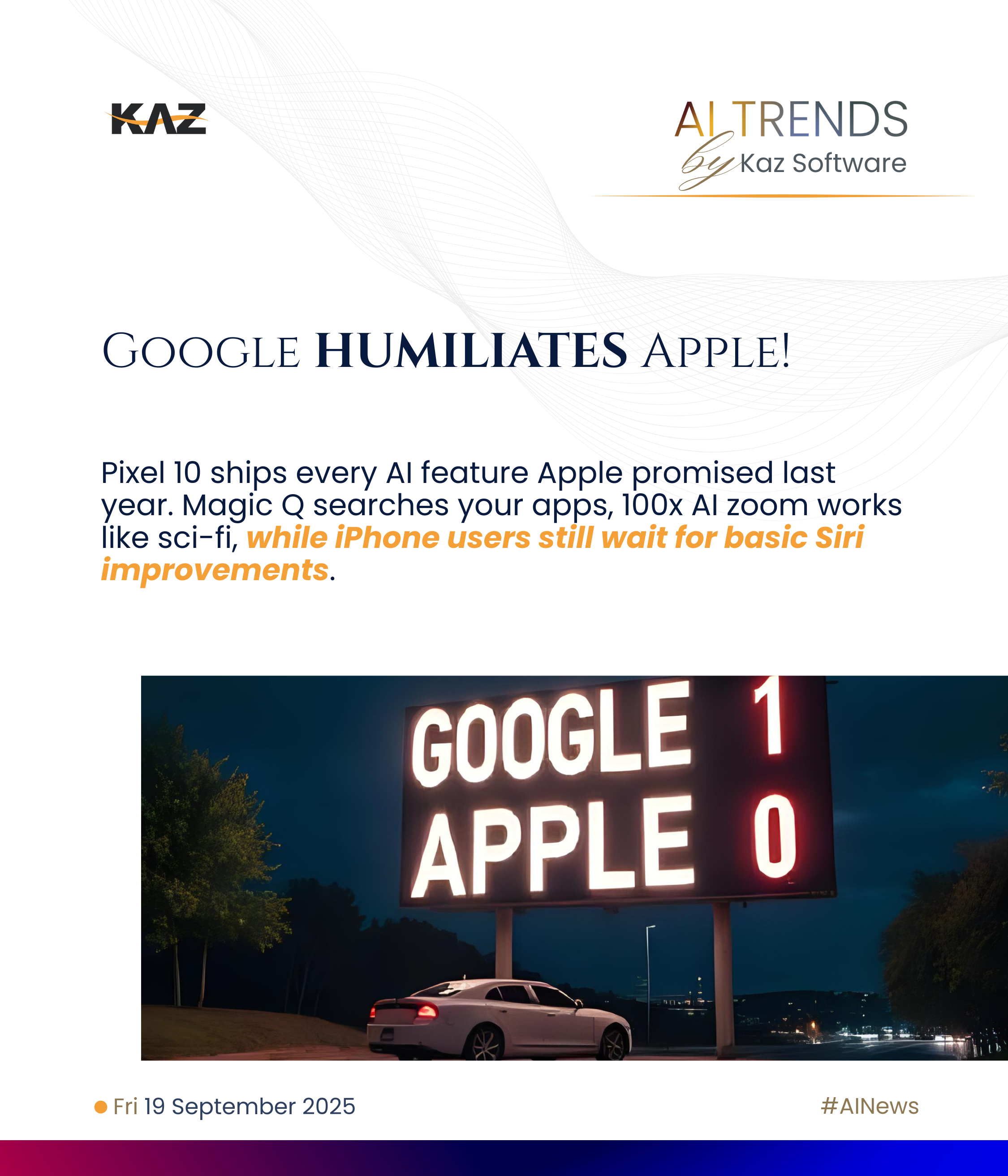Google's Pixel 10 delivers everything Apple promised but couldn't ship
/Pixel 10 launches with AI that searches your apps, detects your mood, and zooms 100x using generative fill—all the features Apple Intelligence promised but never delivered.
Google just did something remarkable. They took Apple's broken AI promises from last year and actually shipped them. The Pixel 10 isn't just another phone with AI features bolted on—it's a complete hardware and software overhaul that makes Apple look embarrassingly behind.
The Wall Street Journal didn't mince words: "The race to develop the killer AI-powered phone is on, but Apple is getting lapped by its Android competitors."
The AI phone Apple was supposed to make
Remember Apple Intelligence? That grand vision where Siri would rifle through your apps, understand context, and actually be useful? Google's Magic Q does exactly that. It searches through your calendar, Gmail, and other apps to answer questions before you even ask them. Friend texts asking where dinner is? Magic Q finds the reservation and pops up the answer. This was literally the core functionality Apple promised but never delivered. What's more damning—Magic Q runs passively. No prompting needed. It just works. The Pixel 10's visual overlay feature uses the camera as live AI input. Point it at a pile of wrenches to find which fits a half-inch bolt. Gemini Live detects your tone—figuring out if you're excited or concerned—and adjusts responses accordingly. These aren't party tricks; they're using mobile's unique context advantage to make AI actually useful.
But here's the killer feature: 100x zoom achieved not through optical lenses but AI generative fill. Google is using image generation to fill in details as you zoom, creating a real-life "enhance" tool straight from sci-fi movies. The edit-by-asking feature lets you restore old photos, remove glare, or just tell it to "make it better." Google's Rick Osterloh couldn't resist twisting the knife during launch: "There has been a lot of hype about this, and frankly, a lot of broken promises, too, but Gemini is the real deal."
The disappointment? No official Nano Banana announcement. This mysterious image model that appeared on LM Arena had been blowing minds with precise edits and perfect prompt adherence. Googlers posting banana emojis suggested it was theirs, but the Pixel event came and went without confirmation. Though edit-by-asking looks suspiciously similar to Nano Banana's capabilities.
Why Reddit hates what could save smartphones
Here's the bizarre reality: Reddit absolutely despises these features. Not because they don't work, but because they contain the letters "AI."
One confused Redditor posted: "I know a lot of you guys don't like AI or anything that has AI, but aren't these new AI improvements on the Pixel 10 genuinely just a nice new feature? It seems like people just default to thinking the product is bad as soon as they see AI in the marketing." This hatred runs so deep that Google's attempt to make the launch consumer-friendly—hiring Jimmy Fallon to host—backfired spectacularly. TechCrunch called it a "cringefest," with Reddit users immediately dubbing it "unwatchable." One user wrote: "I used to wish Apple would bring back live presentations, but after watching the Pixel 10 event, turns out they made the right call keeping them recorded."
The irony is thick. Google delivered genuinely useful features that could transform how we use phones, but wrapped them in marketing so cringe that their target audience rejected everything.
Google's secret weapon isn't software
The real story isn't the features—it's the Tensor G5 chip powering them. Google's new AI core is 60% more powerful than its predecessor, running all features on-device through Gemini Nano. They actually sacrificed overall performance to prioritize on-device AI.
Dylan Patel of SemiAnalysis dropped a bombshell on a recent podcast: Google's custom silicon is Nvidia's biggest threat. "Google's making millions of TPUs... TPUs clearly are like 100% utilized. That's the biggest threat to Nvidia—that people figure out how to use custom silicon more broadly." This is the real power play. While Apple struggles to partner with Google or Anthropic for AI models, Google owns the entire stack: chips, devices, models, and distribution. They've become what Apple used to be—the fully integrated player. Google's Trillium TPU is delivering impressive AI inference performance. They're ramping orders with TSMC. They're not just competing on features; they're building the infrastructure to dominate AI at every level.
The message bubble problem
Despite Google's technical victory, Apple's iPhone orders are actually up. Why? Because for most people, phone choice isn't about AI features—it's about what color your messages appear in group chats.
Mobile handset wars transcend technology. They're about identity, status, and yes, those blue bubbles. Apple's brand power might matter more than Google's superior AI, at least for now. But here's what should worry Apple: Google is delivering the AI phone experience Apple promised over a year ago. Every delay from Cupertino makes Mountain View look more competent. Every broken promise makes "It just works" sound increasingly hollow.
The Pixel 10 proves something important: the AI phone revolution is here. It's just not evenly distributed. While Silicon Valley debates model architectures, normal consumers are getting features that feel like magic—assuming they can get past the "AI" branding.
For Apple, the question isn't whether they can catch up technically. It's whether their brand fortress can withstand Google actually shipping the future while they're still making promises.





